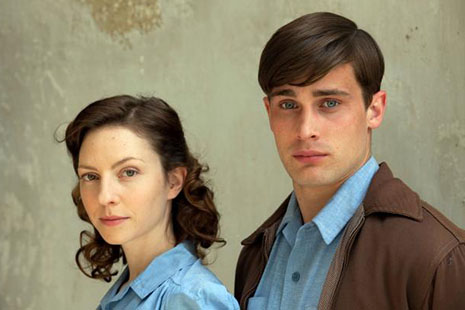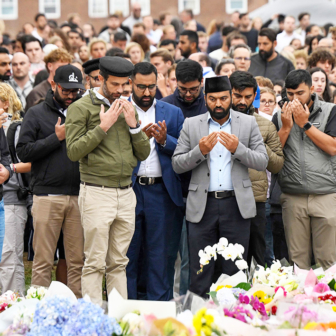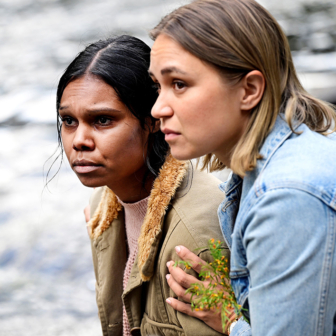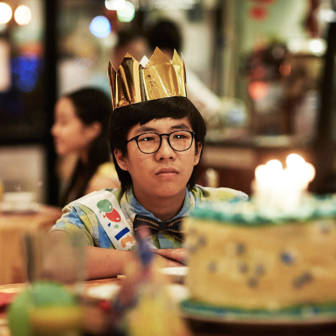PETER Kosminsky’s four-part drama series, The Promise, has produced the same deeply divided response in Britain, France and Australia. From official Israeli and Jewish establishment sources there has been fierce condemnation, nowhere more so than in the formal complaint to SBS, which screened the series in Australia, by the Executive Council of Australian Jewry, or ECAJ. From most other sources the series has received high praise, both as a film and as a contribution to the discussion of the tragic Israeli–Palestinian conflict.
The Promise takes up a problem that has troubled Jewish thinkers since the Zionist project of creating a Jewish homeland or state was first mooted. Since the world had run out of uninhabited lands, what would happen to the people who already lived in the chosen territory? The question was debated with admirable frankness and calmness, but little consensus, by theorists who did not foresee the terrible urgency that the Holocaust would one day bring to it. They asked whether the inhabitants could be lured away by bribery or subterfuge or whether force would be needed. The optimistic view, expressed in Theodor Herzl’s novel Altneuland, was that life in the Jewish state would be so attractive that the indigenous people would happily submit – Israel’s “immaculate misconception” as the Israeli philosopher Avishai Margalit described it to me.
That was never going to happen in Palestine, the land ultimately chosen. The Arabs believed they too had a historic right (some saw it as a divine right), and a British promise, to what an American analyst has dubbed the “much too promised land.” To the Arabs of Palestine it was already their home, where their ancestors had lived for generations, and where they had a right of self-determination as part of the Arab homeland promised by the British in return for Arab help in the first world war. When they were told that the fine print left Palestine out of the Arab promise, and that Britain would instead honour its promise of a Jewish homeland, the Arabs felt betrayed and threatened, and predictably resisted.
As the ECAJ’s complaint about The Promise notes, Arab objections to Zionist-inspired immigration go back to its beginning in the late nineteenth century. But the objection was not, as the ECAJ may expect the reader to assume, an irrational objection based on prejudice; as the historian Benny Morris emphasises, it was a well-grounded, and indeed prescient, fear that the Zionists wanted to take their country. The official recognition and support of the Zionist project resulted in acute and growing conflict during the British mandate, and open warfare when a Jewish state emerged with UN blessing. Although Israel triumphed in the wars of 1948 and 1967, and remains in military control today, the question remains: what is a just solution to the competing claims of Jews and Arabs? What could once be debated as a historical or theological problem is now an existential human problem: what is going to happen to the five million Jews and five million Arabs who today live in Palestine? They all need a home.
This is the question implicitly asked by The Promise. Kosminsky does not answer it, but he gives a powerful reminder to a readily forgetful world that the question has always been there and remains there, and that the failure to answer it has had and continues to have terrible consequences. He does this by interweaving two stories, one of Len, a British sergeant serving in Palestine in 1946–48, and the other of Len’s eighteen-year-old granddaughter Erin, who visits Israel in her gap year in 2005. Initially the purpose of Erin’s trip is to give moral support to Eliza Meyer, her Jewish school friend who is returning home to Israel to do her military service. But in her grandfather’s diary she finds a house key that Len had promised to return to its owner, and she sets out to fulfil his promise.
The interwoven stories, rich in incident, character and plot, provide two snapshots of the ongoing conflict between two peoples seeking to live in the same land. In 1948 the Jews are the people without a home, desperately seeking to create not just shelter for the wretched refugees from the Holocaust but also a refuge for all potential victims of anti-Semitism in the future. The snapshot shows the length to which desperate people will go, and shows how the conflict is starting to make Arabs into refugees. The second snapshot, in 2005, shows that Jews now have a homeland but Palestinians do not. Established but isolated in their homeland, symbolised by the Meyer family in the bubble of the coastal town of Caesarea, Israelis are ignoring the needs of the Palestinians, who see Israel taking more and more of the only land that could provide their home. Israel has a monopoly of military force and Palestinians respond with the shocking weapon of the weak, suicide bombing, to which Israel retaliates by demolishing houses.
Kosminsky has emphasised that he did not set out to take sides or offer solutions; his first responsibility was to present an image that did justice to the complexity of the situation. Historians and political commentators have written many volumes about this complexity, and the film was based on years of research. In contrast to a historian, the artist and film-maker must choose a few characters and events to capture the viewers’ attention, stimulate their minds, fire their imaginations and touch their consciences. It is inevitable that people with an existing view about Palestine will be disappointed that this or that point dear to them was not made or emphasised, but they can still be grateful that Kosminsky has put the fundamental problem on the table in a high-quality film with great human impact.
Apologists for special interests have a choice. They can be open to The Promise as one of many ways a film about the Israel–Palestine conflict could be made, they can accept its challenge to seek solutions, they can learn from it, even if some of the lessons may be painful, and they can offer competing views and interpretations and emphasise different points if they wish. Alternatively they can firmly close their minds, refuse to recognise the challenge or seek solutions, resist any lessons they could learn, and seek to suppress the film. In that endeavour they may seek to place stereotyped and demeaning interpretations on the film. Antony Loewenstein, in his 2006 book My Israel Question, was far from the first to deplore the tendency to portray criticism of Israel and its policies as anti-Semitism, a practice he saw as wrongly conflating Zionism and Judaism.
IN ITS thirty-one-page complaint, the ECAJ compares The Promise with Jud Süss, a “Nazi propaganda film” praised by Goebbels and made compulsory viewing for Nazi death squads. The complaint asserts, without particulars, that “the ancient libel that holds all Jews throughout history to be collectively guilty of killing Jesus has been segued into the equally ludicrous proposition that all Jews are collectively guilty of the wanton shedding of innocent blood.” It complains about the historical background but its major allegation is that “all of the principal Jewish characters (and thus by implication Jews generally) are portrayed negatively and, ultimately, without any redeeming virtues. They are cast as variously cruel, violent, hateful, ruthless, unfeeling, amoral, treacherous, racist and/or hypocritical... The series also panders to stereotypes about Jews being immoderately wealthy and having acquired their wealth unfairly.”
In contrast, an English reviewer for the Israeli website Eretz Acheret noted that “the Israeli characters are drawn sympathetically and realistically, with not a hint of demonisation.” The ECAJ reaches the opposite conclusion only by itself imputing unfavourable attributes to the Jewish characters, judging them by harsh and unrealistic standards, interpreting their conduct in the worst possible way, and making quite absurd comparisons. There is a striking irony in a Jewish organisation’s striving to show that every Jewish character is a demon and every Arab character a saint. One by one, the ECAJ’s submission proceeds to do a hatchet job on every Jewish character of any importance, rejecting the humanity with which Kosminsky endows each of them, and substituting an anti-Semitic stereotype of its own manufacture.
The ECAJ gives what it calls “seventy-five examples of negative stereotyping of Jews” in its complaint. I can only deal with a few here, but an extended response to the complaint can be found here. The complaint itself can be found here.
Much of the calumny is directed at Erin’s hosts, the Meyer family. The complaint says that “none of the Arab characters speaks with a raised voice, in stark contrast to the violent, quarrelsome, hate-filled Jewish families.” It is in the nature of the plot that viewers see an Arab family only briefly on the special occasions of entertaining an important visitor, when they are naturally on their best formal behaviour. In contrast, Erin is asked to treat the Meyer household as her home, and becomes a part of the family. She sees everyday family life, in which a father has heated arguments with his youthful son over politics but rushes frantically to his side when he is injured, a younger sister calls her older brother insane but has deep affection for him, a mother reacts angrily to those who blow up her son by calling them “animals,” and parents treat their daughter’s friend with great care and responsibility. Erin finds the parents “the kindest and most generous” people she has known and, despite his despair at their politics, their argumentative son agrees.
By no stretch of the imagination is this a “violent, quarrelsome, hate-filled” family. It is a normal family. Its members are human beings, neither demons nor saints. Viewers who have been confronted for the first time by someone experiencing an epileptic fit will know that when the Meyer parents are momentarily paralysed with shock when Erin collapses in front of them, they are not being shown as “cold, insensitive, unfeeling, callous, cruel,” in the ECAJ’s words.
It is, however, a family whose members are awkward and at a loss for words or actions when, owing to Erin’s naivety, they find Omar, a real, live Arab peace activist, in their luxurious home. Omar shows similar unease, his only conversational gambit being to needle his hostess by asking where her family came from. In its search for an anti-Semitic interpretation, the ECAJ accuses Kosminsky of using this incident as “the vehicle for conveying the alien-ness of Leah and her husband Max (and by extension all Jews) to the land, further estranging them from the audience’s sympathy,” and of portraying them as “ungracious and racist,” “cold, insensitive, unfeeling, callous”and “cruel.”
Such an interpretation may appeal to anti-Semites who are trying to discover an anti-Semitic meaning. They will miss the more reasonable interpretation. What the film is doing, in effect, is dramatising Benny Morris’s observation that a “mutual lack of empathy” has characterised the Palestinian conflict from the beginning. Palestinians, he says in his book, Righteous Victims (1999), “never really understood the Zionist claim to the land” and Zionists “were uninterested in the Palestinian Arabs’ nexus with the soil.” “Thus, the Zionist–Palestinian conflict, which was the origin and remains the core of the Israeli–Arab conflict, has been characterised by a crude and brutal perceptional symmetry.” The message of The Promise is that Israelis and Palestinians must get beyond this and see each other as human beings who, among other things, need a home.
The lengths to which the ECAJ will go is illustrated by its attempt to demonise the convicted terrorist Avram Klein by comparing him with the Zionist leader Dov Gruner, on whom he is loosely based. The ECAJ presents Gruner as admirable in every respect, whereas Klein is said to be portrayed as “a blinkered fanatic who could have saved his own life by appealing his sentence to the Privy Council,” who uses “words that demonstrate that he refused to do so in a vainglorious quest for martyrdom,” and who in contrast to Gruner failed to win the respect and admiration of his guards. In fact, the film depicts Klein more favourably on all three scores.
First, Klein refuses to appeal whereas Gruner refused to defend himself at all. Second, speaking to Len in a friendly tone, Klein quietly utters the succinct and dignified words, “If you kill me you’ll regret it. Every movement needs its martyrs,” whereas Gruner bombastically told the court that nobody “could sever the tie between the Jewish people and their one and only land” and that “whosoever tries to sever it – his hand will be cut off and the curse of God will rest on him forever.” And, third, whereas Gruner won the respect and admiration of his guards, Klein is given a greater accolade: he wins the respect and friendship of Len, the sergeant who is the leading British character.
The ECAJ complains that because of the lack of certain background historical detail the film “shuts off any possibility that the viewer might understand how Jews who saw themselves as fighters for a noble cause could commit atrocities.” The reverse is true. The sympathetic portrayal of the terrorist Klein has been mentioned. Eliza Meyer’s grandfather, who lost most of his relatives in the Holocaust, was also a 1948 terrorist, and explains that after the Holocaust members of his generation were determined to carve out a land that could be safe for Jews forever. The British stood in their way, so the Jews “wiped them out. It was as simple as that.” Far from shutting off the possibility of understanding his implicit claim to act in a noble cause, the film shows a concentration camp and wretched refugees. It presents Eliza’s grandfather as an ordinary, civilised human being and passes no judgement on him. It is the ECAJ, not the film or the normal viewer, who finds him “obdurate and unapologetic for his part in an atrocity” and “lacking a moral compass.” Why does the ECAJ make this harsh judgement? The case put in his mouth is the case made by the real-life terrorist Menachem Begin, who blew up the King David Hotel and was later prime minister of Israel; it is the case made by Benny Morris, a historian admired by the ECAJ, when he justifies the uprooting of 700,000 Palestinian villagers from Israel as necessary for its ethnic “cleansing” (the term used at the time).
Viewers who have lived comfortable lives in peaceful countries like Australia and never faced challenges like those faced by Jews in Palestine in 1948 may be horrified by what was done and unable to identify with the case made in support. It does not follow that they will share the ECAJ’s harsh condemnation of those involved as people without a moral compass. Rather they will see them as vulnerable human beings with strong moral compasses pulled off course by experiences of anti-Semitism, culminating in the overwhelming effect of the Holocaust and all the tragedies that went with it. They will not join the self-righteous rush to judgement of those individuals, and certainly not the ridiculous extension to Jews generally that the ECAJ postulates.
What the ECAJ seems incapable of understanding is that the film is not making or inviting judgements. It is implicitly saying that it is too late for that; here is a terrible human problem that has to be faced.
AN IRONY of the ECAJ’s complaint is that Kosminsky has gone out of his way to discourage people from drawing anti-Semitic inferences from his film. Far from trying to blacken Israel, he shows that practices for which Israel is unfavourably known have been practised, and indeed were invented, by others. He shows the gratuitous humiliation of Palestinian civilians by soldiers and political assassinations as practised only by the British, and the retaliatory destruction of houses used by terrorists as practised by both Britain and Israel.
It would have been very natural for the film to mention the history of Caesarea, where Erin is staying, and it would have helped explain why the Meyers are so taken aback when an Arab turns up in their home. The Caesarea community website records without any indication of embarrassment or regret the expulsion of all Arabs in 1948. Benny Morris adds the details that they were expelled by the Haganah (which the ECAJ invokes as a symbol of Jewish rectitude) in mid February 1948 (three months before the Arab invasion to which the ECAJ attributes the war), despite the fact that according to Jewish sources the villagers had “done all in their power to keep the peace in their village and around it… [and] supplied agricultural produce to the Jewish market in Haifa and Hadera.”
Telling this story would have been easy pickings if Kosminsky had really been out to put Israelis or Jews in a bad light. It would also have pre-empted the ECAJ’s criticism that The Promise shows a Jewish swimming pool but not an Arab swimming pool in Caesarea. Perhaps the ECAJ is unaware that in Israel generally, far fewer Arabs than Jews can afford swimming pools. In Israel 58.5 percent of Arab families (as compared with 20.7 percent of Jewish families) are defined as living below the poverty line
The ECAJ is not only ungenerous in failing to recognise Kosminsky’s restraint. It acknowledges his Jewishness by a quotation about “self-hating Jews” who “betray their own people,” and speculates that he set the film in 2005, instead of 2010 when it was filmed, so that Erin could say to the soldiers about to blow up a house in Gaza: “Don’t drive them out of Gaza.” It ignores Kosminsky’s explanation that, having done his research before 2005, he wanted to include events like suicide bombing, which had ceased several years before 2010.
IT IS reassuring that the SBS complaint process rejected ECAJ’s complaint and showed no difficulty in recognising the true character of the film. But this does not mean that no harm has been done, or that no harm would be done by similar baseless attempts to smear individuals, organisations, books or films in the future. A number of groups are entitled to feel fearful, angry or dismayed by the ECAJ’s attempt to use the smear of anti-Semitism to suppress access to this film.
First are the viewers of SBS, who watch its programs because they are distinctive and open windows on the world not readily available elsewhere; they do not want it confined by unjustified rulings and, more importantly they do not want its future decision-making intimidated by the mud that will stick from this exercise or the fear of other baseless attempts to smear it in the future.
More generally, the people of Australia want freedom of access to information, points of view, and artistic representation in all their media in order to conduct their intellectual, political and moral life, without its being confined because some people are so sensitive to criticism of themselves or their cherished interests that they will go to any lengths to protect them. As citizens they also want those who make decisions on their behalf to be able to exercise Australia’s influence in the world not only on an informed basis but also free of similar intimidation. Those who have a special concern about the achievement of just solutions to problems of the Middle East, and would like the millions of Jews and the millions of Palestinians who live there to do so in freedom and justice, uncorrupted by the temptations of power or the temptations of powerlessness, will be particularly concerned.
There are many who value the great contributions that Jewish people have made to the intellectual, moral and artistic life, and particularly to the pursuit of social justice, in our civilisation. They are dismayed to see their contributions limited and their moral compasses sometimes distorted by the acceptance of the duty of short-sighted and uncritical defence of Israel, right or wrong, which the ECAJ’s complaint exemplifies. There are many, too, who believe that it would be a tragedy if all the courage and sacrifice and idealism that has gone into the building of Israel should result only in a pariah state because of its denial of justice to Palestinians.
If it is to maintain balance among the destabilising forces raging within and without, Israel is in desperate need of trusted but frank and independent critical voices such as the Diaspora could provide. Australian Jews can play such a role only if they open their eyes and ears and hearts and minds to the messages of the writers, artists, thinkers and people of insight and goodwill in the world, rather than attempt to shoot the messengers. Fortunately more and more are doing this. •




